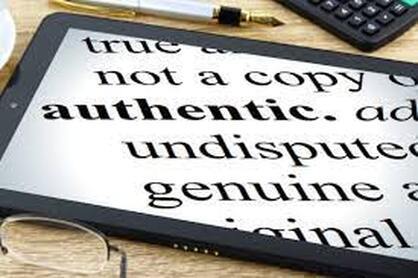Authentic or Genuine?
 The words authentic and genuine are similar in meaning. Both words carry connotations of truth, reliability, and trustworthiness.
The words authentic and genuine are similar in meaning. Both words carry connotations of truth, reliability, and trustworthiness.The word authentic has its origins in Proto-Indo-European (PIE) sene-(2) (to accomplish, to achieve) and Greek hentes (doer, being). The word authentic is a combination of Greek auto (self) + hentes = authentes; i.e., to act with your own authority, to be a master of yourself.
By the late-14th century, the word autentik, from Greek authentes and authentikos (original, genuine, principal) came to English meaning real and entitled to acceptance as factual. To authenticate, meaning to verify or establish the credibility or authority of something, is from the 1650s. The word authenticity is from 1760. Inauthentic is from 1783.
Something authentic is the real thing; e.g., an authentic Ming vase or an authentic signature on a document. Also, authentic can mean something as close as possible to an original real thing; e.g., a reproduction of the armor of a medieval knight can be authentic (i.e., it is a true and trustworthy representation), but it does not claim to be genuine. It is a copy.
The word genuine, from PIE gene (to beget, to give birth), means something unique from a natural or an innate source; e.g., genuine leather is made only from animal skin. Something genuine is not fake or artificial or a reproduction. A leather bag made by Gucci is a genuine Gucci bag. A counterfeit Gucci bag may be a really good reproduction, but it is not genuine.
In brief, authentic can refer to something original or to a reproduction. However, genuine usually only refers to something unique and original.
How is a person genuine or authentic? A person cannot help but be genuine—each of us is born as a unique person, not a copy of someone else! When someone says, “Just be yourself”, your response might be, “Who else could I be?”
On the other hand, being authentic seems more of a relational category; that is, a person self-consciously chooses to be who they are or who they will be in any given circumstance. Such authenticity is a reflection of what a person is thinking, feeling, perceiving, and believing.
In brief, the word genuine refers to a person’s honest and sincere ways of relating to other people and to what others may see in that person. The word authentic refers to a person’s ways of relating to themself, a way of being ‘true to themself’, so to speak.
The concept of ‘authentic assessment’ in education and training means the assessment of a learner’s mastery of the application of knowledge and skill in ‘real world’ situations or as close as possible to ‘real world’ (i.e., authentic) situations; for example, assessing learners in an actual workplace-related practicum, not in a classroom or lab.
Reference: Online Etymological Dictionary, https://www.etymonline.com/
Published on February 20, 2023 19:05
No comments have been added yet.



